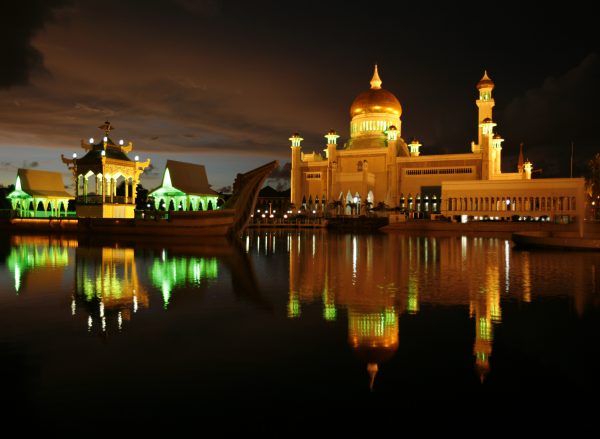This is constitutive of a broader practice of ‘repressive but responsive politics’, distinguished by the state’s nurturing loyalties among its citizens through its provision of public sector positions and comprehensive welfare schemes, but also securing their compliance through systematic enforcement.
In responding specifically to the pandemic, the government swiftly crafted a four-stage de-escalation plan, firmed by a dedicated budget allocation of BND15 million (US$10.5 million) with which to meet viral outbreaks and emergencies.
These effective policy choices are supported in Brunei by institutional and structural features. Most notably, Brunei’s state capacity and public services are made potent by the revenues generated through its oil and gas industries.
The Sultanate confronted declining commodity prices during 2020. And in the longer term, it faces the outright exhaustion of its endowment. But meanwhile, in addition to funding the state apparatus, its hydrocarbon industries have imparted structural advantages by which to help in containing the pandemic. Brunei’s enclave economy and dispersed energy founts leave the country less porous and densely urbanised than its Southeast Asian neighbours. Its insulated, relatively prosperous and diffuse population has aided greatly in slowing the rates of viral transmission.
In these conditions, there was little need for Brunei’s government to mimic the global trend in 2020 of tightening authoritarian controls amid ‘opportune’ pandemic pressures. Given its institutional and structural advantages, the Sultanate’s regime was autocratic enough, enabling decisive executive decision making and effective policy output. If anything, the government’s focused ministerial messaging opened new apertures of communication, with live events conducted daily on television and through social media, substantiated by round-the-clock hotline services for inquiries about COVID-19.
In late January, Brunei also showed policy courage by banning inbound travellers from Hubei province, risking China’s wrath. On 1 February, officials began to screen arrivals from all countries, taking temperature checks at entry points.
A first case of COVID-19 in Brunei was detected on 9 March. This ballooned to 100 cases in just 15 days, evidently triggered by a worshiper returning from a tabligh gathering in Malaysia. Brunei’s Sultan, in addressing his now gloomy subjects at the start of Ramadan, invoked both science and faith when promising that the pandemic would be contained in Brunei, stating that ‘I believe this because of the united prevention efforts and also because of prayer’.
To this end, Brunei’s Ministry of Health, quickly adopted World Health Organization regulations, including social distancing and self-isolation, as well as contact tracing through the Sultanate’s Bruhealth application to which some 90 per cent of citizens subscribe. Places of worship and indeed all venues of congregation were closed, evoking in a deeply theocratic setting the determination with which officials addressed the pandemic.
Through whole-of-government strategies, key ministries collaborated with sundry construction and engineering firms to build a new virology facility in two weeks’ time. BND11 million (US$8.3 million), drawn in part from the ‘COVID-19 Relief Fund’, was also spent to complete extension to the National Isolation Centre in three weeks, doubling the Sultanate’s hospital bed capacity. Meanwhile, to guard against any non-compliance, the government enforced procedures with fines and jail terms.
In early May, no new infections were recorded in Brunei. At the end of November, just nine new imported cases and three deaths were reported, indicating the effectiveness of the sultanate’s pandemic policy choices amid favourable institutional and structural conditions.
Brunei began, then, to reopen its economy much earlier than many countries afflicted with COVID-19. Throughout the year, citizens remained barred from international travel. But in July, markets, restaurants and gyms were permitted fully to operate, while event expositions were restarted. Brunei’s government, like those everywhere, fretted over severe downward pressures on the Sultanate’s economy.
Despite the pandemic, the government has continued with its development programs. These include the promotion of private sector entrepreneurial activity and commercial agriculture, enhanced digital connectivity and physical transportation links, made most visibly manifest in the new Temburong Bridge. As these programs were undertaken, they did not appear to worsen viral transmission. But they did contribute to unaccustomed levels of government transparency, foregrounded by the Health Ministry’s frequent and open announcements.
Other instances of government transparency are growing apparent. For example, in January 2020, as COVID-19 gained traction, two former judges were found guilty of embezzling nearly US$16 million from the High Court’s Bankruptcy Office. This was declared as the largest amount of funds ever stolen by Brunei civil servants. The case attracted intense coverage and public interest since starting in mid-2018. The judges were married, and the husband was the son of the minister of religious affairs.
Brunei’s government, aided by institutional and structural conditions, has acted effectively on policy preferences by which to contain the pandemic. Despite the need for major planning decisions and attendant shifts in resource allocations, the government, in contradistinction to global trends, avoided tightening its repressive-responsive regime. It showed glints of greater ministerial communication and transparent dealings. Brunei remains placid in its political life and an abode of peace.
Nadia Azierah Hamdan is a postgraduate student at the University of Nottingham Malaysia.
William Case is Professor and Head of School of Politics, History and International Relations at the University of Nottingham Malaysia.
This article is part of an EAF special feature series on 2020 in review and the year ahead.

